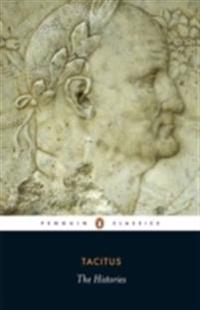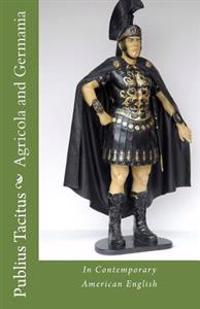Tacitus (Inbunden)
avCornelius Tacitus
ISBN: 9780674991231 - UTGIVEN: 1985-06Tacitus (c. 55 c. 120 CE), renowned for concision and psychology, is paramount as a historian of the early Roman empire. What survives of Histories covers the dramatic years 69 70. What survives of Annals tells an often terrible tale of 14 28, 31 37, and, partially, 47 66.[...]
Tacitus' Germania - Scholar's Choice Edition (Häftad)
avCornelius Tacitus
ISBN: 9781293938492 - UTGIVEN: 2015-02Tacitus' Germania - Scholar's Choice Edition (Häftad)
avCornelius Tacitus
ISBN: 9781293940358 - UTGIVEN: 2015-02Tacitus: Annals Book IV (Pocket)
avMartin, R, Tacitus, Cornelius Annales B, Tacitus, Tacitus
ISBN: 9780521315432 - UTGIVEN: 1990-01-25The fourth book of Tacitus' Annals has been described as "the best that Tacitus ever wrote." It covers the years AD 23-28, starting when Tacitus noted a significant deterioration in the principate of the emperor Tiberius, and the increasingly malign influence of his "evil genius" Sejanus. R.H. Marti[...]
Tacitus and the Principate: From Augustus to Domitian (Pocket)
avChristopher Burnand, Cornelius Annales B. Tacitus
ISBN: 9780521747615 - UTGIVEN: 2011-07-21An exciting series that provides students with direct access to the ancient world by offering new translations of extracts from its key texts.[...]
The Histories (Storpocket)
avCornelius Tacitus
ISBN: 9780140449648 - UTGIVEN: 2009-06In AD68 Nero's suicide marked the end of the first dynasty of imperial Rome. The following year was one of drama and danger, though not of chaos. In the surviving books of his "Histories" the barrister-historian Tacitus, writing some thirty years after the events he describes, gives us a detailed ac[...]
The Annals (Pocket)
avCornelius Tacitus
ISBN: 9780192824219 - UTGIVEN: 2008-08-10The Annals is a gripping account of the Roman emperors Tiberius, Claudius, and Nero and the brutality that marked their reigns. Tacitus deplores their depravity, proof of the corrupting force of absolute power. J.C. Yardley's vivid and accurate translation is complemented by a thorough introduction [...]
Germania - Scholar's Choice Edition (Häftad)
avCornelius Tacitus
ISBN: 9781293938645 - UTGIVEN: 2015-02Agricola and Germania: In Contemporary American English (Häftad)
avPublius Cornelius Tacitus, Marciano Guerrero
ISBN: 9781499625486 - UTGIVEN: 2014-05The Germania and the Agricola (Aziloth Books) (Häftad)
avCornelius Tacitus
ISBN: 9781909735330 - UTGIVEN: 2014-01Romersk retorikk (Pocket)
avMarcus Tullius Cicero, Marcus Fabius Quintilianus, Cornelius Tacitus
ISBN: 9788252174786 - UTGIVEN: 2009Cicero, Quintilian og Tacticus, tre av dei fremste retorikarane frå det gamle Roma, drøftar her spørsmål om språkleg påverknad og tek opp filosofiske problemstillingar.[...]
Germania (näköispainos) (Häftad)
avCornelius Tacitus
ISBN: 9789522153173 - UTGIVEN: 2013Kuuluisan muinaisen historiankirjoittajan vangitseva kansanhistoriallinen teos Germanian kansasta Rooman valtakunnan kulta-ajoilta K.J. Hidénin suomennoksena vuodelta 1904.[...]
Annals and Histories (Inbunden)
avTacitus, Cornelius Annales B. Tacitus
ISBN: 9780307267504 - UTGIVEN: 2009-10























